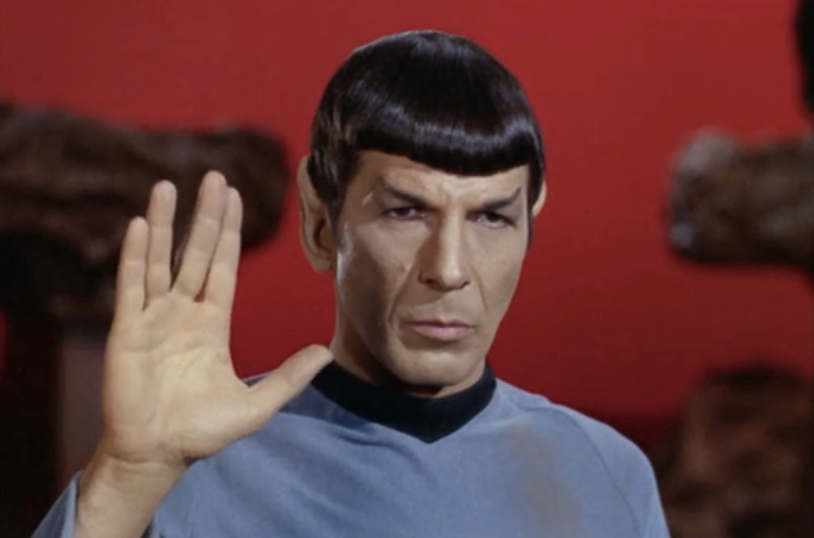essays
How Leonard Nimoy’s Spock Taught Me to Be a Writer

If I’d been raised with any sort of religion, Spock would have been my family’s patron saint of the dictionary. Sticking a grade-schooler in front of Star Trek might lead to a brief obsession with spandex, but with me it also meant absorbing tons of non-grade school words. From “purview” to “enmity” to “geneticist” to plain-old “stoic,” the scholarly verbal style of Mr. Spock made my child-self even more bookish than I already was. But my connection with Spock went beyond words. Because while Leonard Nimoy’s performance as Spock did make me love books differently, he also taught me about the inherent coolness of being your own brand of brainy outsider.
Leonard Nimoy’s recent passing has made a lot of us nostalgic about his impact on pop culture and all of our lives, specifically. In competition with all of television ever, the various Star Treks have the monopoly on smarty-pants, bookish characters, and among those characters, none were more intelligent or more sophisticated than Mr. Spock. Spock is regarded as the great brainy scientific guy of his universe, but really, the character is a little more nuanced than just being “the smart one.” Instead, Spock is the representative outsider in a universe of outsiders. If Star Trek was long regarded as something only for nerds (outsiders) then Spock was the Trekkie who lived in Star Trek, often mocked by his friends and colleagues for his inherent “otherness.” Nimoy’s portrayal of this kind of outsider appealed not just to “geeks,” but people of mixed ethnic heritage, too. His hopeful commiseration with a biracial young fan back in 1968, recently resurfaced, illustrating just how much people benefited from Spock for identification and comfort.
In the narrative of Star Trek, Spock is a biologically half-human/half Vulcan among people who are full-on humans. In this fictional future, Spock’s status as an officer in Star Fleet is eschewed by his dad because it breaks with Vulcan tradition; father Sarek wanted Spock to go to the Vulcan Science Academy. If you’re a kid who’s ever told your parents you want to be a writer instead of having a “real career,” you know what this is like. By being an actual space-alien who is both alien to humans and sort of looked-down on by his own people, Spock rocks the whole Groucho Marx-not-being-part-of-a-club-that-would-have-him-as-a-member-thing really hard.
And yet, the writing on Star Trek was better than you can believe. Mr. Spock could easily have been reduced to comic relief; a fish-out-of-space-water played for laughs. True, in some of the 60’s Star Trek’s most wha-wha moments, the crew of the Enterprise laughs heartily at how much Spock “doesn’t get it.”But those stumbles are trumped by the fact that Spock is so much more well-read than Captain Kirk, Bones, Scotty, and even the guy named Chekov. Here’s a guy who can quote from any philosophic text and most of the western canon literally without blinking an eye (though occasionally arching an eyebrow). The half-alien among a group of smart humans knows more about “their” books than anyone else. Spock has read Dickens and likes him. He’s brushed up on his Shakespeare and insinuates that he is the literary (and maybe biological) decedent of Sherlock Holmes. If you were in the minority of being bookish growing up, it was pretty easy to locate yourself in Mr. Spock.
But Spock was the beginning of Geek Chic, which means Spock’s brand of bookish hipsterdom isn’t arch despite all the eyebrow arching. Though you could call Spock a sexier Sherlock Holmes from Outer Space that would be doing him a disservice because he’s more of an original character than that. He’s stoic and detached from his emotions partially because he’s born that way, but partially because it’s the only way he can figure out how to function. As a little kid, I was teased a lot for having a dorky gait, nerdy clothes or nerdy interests. Both laughably and painfully, I can remember confronting playground bullies by telling them that throwing rocks or dirt clods at me wasn’t “logical.” This paraphrasing of Spock’s favorite subject — logic — is an obvious defense mechanism as a little kid. If you pretend not to have feelings (like Spock does), you can’t get those feelings hurt. Spock isn’t a cool nerd because he’s affecting anything at all. He’s a cool nerd because he’s so obviously fucked up, but doesn’t really give a shit what you think of him. He does this because — for the most part — he’s totally in control of his emotions.
This is why the best Star Trek episodes deal with Spock totally losing it.
Whether it’s his hormonal breakdown in “Amok Time,” clashing with his father in “Journey to Babel,” or his noble sacrifice in Star Trek II: The Wrath of Khan, Spock is best liked by audiences when he’s being forced to deal with the kind of stuff brainy artists try to control: raw feelings which can’t be explained or contained. When I was in fourth grade I proudly said my favorite book (like of ALL time) was a Star Trek novel called Yesterday’s Son, written by the wonderful writer A.C. Crispin. In it, Crispin postulates that Spock has an illegitimate son living in the ancient past of a slightly barbaric planet. When reunited, Spock and his son “Zar” (cool name!) do not get along. As a fourth grader, this novel blew my mind because I had no idea who I was supposed to side with. (I was also fuzzy on how Spock could have a kid he didn’t know about, but whatever…) Why was my nerdy hero Spock being saddled with responsibilities of adulthood? At this point, I thought his primary job was to zip around space with his best friend Captain Kirk, what was the deal with all the soul searching? Perhaps there was more too storytelling than big adventures. Spock and Star Trek made me wonder if all of this was just a little more real than I’d previously assumed. After this, one of my earliest short story attempts was straight-up Star Trek fan fiction. In it, a 10-year-old boy (guess where I got that idea) was imbued with Spock’s “katra” (his soul.) In Star Trek III, Spock’s katra actually rattles around in the head of his good friend Dr. McCoy, so I figured someone like me could probably get Spock’s soul, too. If a 5th grader was harboring Spock’s soul, would anyone really know? How could you prove it? Or, more interestingly, how could anyone prove that I wasn’t Spock?
In one of his last interviews with Hero Complex for the LA Times late last year, Leonard Nimoy noted that from an early point, he realized that the character of Spock had a fantastic “interior life.” This strikes me as being 100% correct and exactly what is so compelling about the way Nimoy conceived of and created this fictional person. If you were so full of passion, but you didn’t really know what to do with it, you might come across as stoic, too. Among my writer-friends, I notice I’m one of the more loud-mouthed ones at the party, but among non-writers, I’ve become more tight-lipped as I’ve grown older. More stoic. More Vulcan. My emotions, I find, have a place in my writing, but sometimes incorporating them healthily into my life is hard. Nobody struggled with this more than Mr. Spock.
I think most writers (and other artists) are all more like Vulcans than we care to admit. We aren’t inherently cold and emotionless, but instead, compartmentalized with our feelings. In the fictional history of Star Trek, the Vulcan race was once even more violent than the human race, before everybody got their act together. Meaning, Spock is suppressing and controlling all sorts of inherently destructive impulses. But he channels that (healthily or not) into his work. This vortex of chaos keeps him going, which is why we love him. Our interior lives are often a vortex — and sometimes that vortex is Star Trek style, like the creature who can drive you insane if you look directly at it in the episode “In Truth is There No Beauty?”. This alien thing — a Medusan — supposedly makes you insane because it contains too much truth. We never saw much of Spock’s creative output (a song played on the Vulcan harp here and there) but as a prose writer, I think Spock would have been uniquely equipped to handle the kind of too-close-too-home action that being a writer requires. After all, he looked into the vortex of that Medusan truth monster and lived to tell the tale.
Ultimately, Spock’s interior life and personal conflicts exist because we believe Spock exists. Meaning, had Leonard Nimoy played his character with an ounce of sarcasm, the complexity and identification many of us had with this character would not have materialized. Spock wasn’t just a metaphor for our interior lives, he was a real person. We will all miss Leonard Nimoy. He was a fantastic writer, director, husband, father, philanthropist, and of course, actor. But in rendering the paradoxically confused confidence of Spock, he made many of us Stark Trek fans into artists, thinkers, and writers. Which if you allow yourself to consider for one second, is totally and completely, fascinating.









